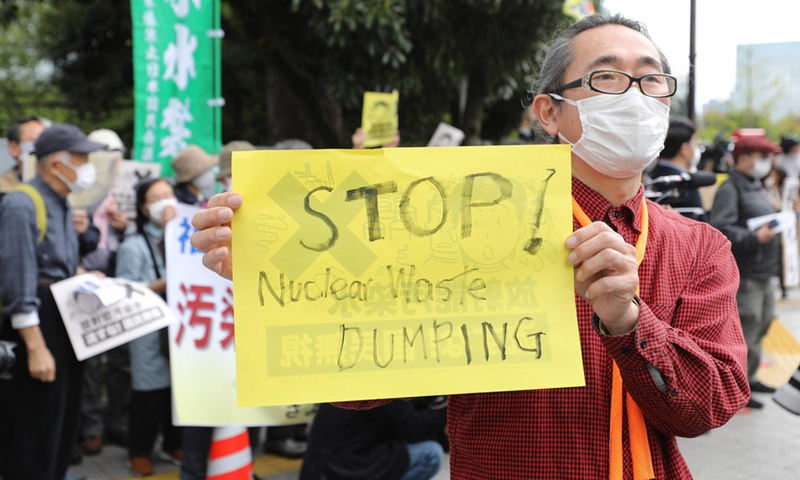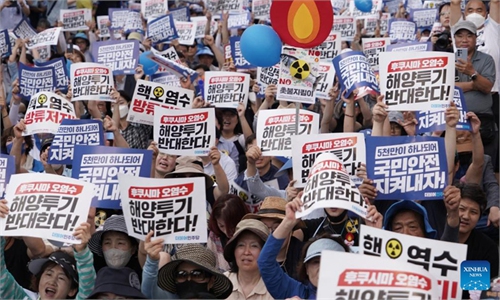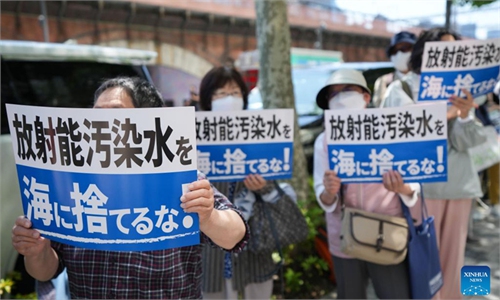China expresses 'regret' over IAEA safety report clearing Japan's nuclear-contaminated wastewater discharge plan

People rally to protest against the Japanese government's decision to discharge contaminated radioactive wastewater in Fukushima Prefecture into the sea, in Tokyo, capital of Japan, April 13, 2021. Photo: Xinhua
The safety report by the International Atomic Energy Agency (IAEA) on the Japanese government's plan to discharge Fukushima nuclear-contaminated wastewater failed to fully reflect the opinions of all experts involved in the review and the conclusions were limited and biased, Deng Ge, secretary general of the China Atomic Energy Authority (CAEA), told the media on Tuesday, after the IAEA concluded that the discharge plan is consistent with IAEA safety standards.
China expressed "regret" that the IAEA had hastily released the report, Deng said. China has urged Japan to face up to the legitimate and reasonable concerns of the international community, as well as the opinions of the IAEA and other international professional and authoritative agencies.
The discharge of nuclear-contaminated wastewater should not be started without credible evidence of its legitimacy, and until effective corrective measures have been taken in response to the IAEA's assessment, according to CAEA.
Japan has not proved the legitimacy of the decision to discharge the nuclear-contaminated wastewater into the sea. After the Japanese government made a unilateral decision, it was under pressure to request the IAEA to carry out a review and assessment. But Japan deliberately restricted the IAEA technical working group's authorization so that the review would be limited to only one option of discharging the nuclear-contaminated wastewater into the sea, with other possible disposal options excluded.
Even if the IAEA considers discharging the nuclear-contaminated wastewater into the sea to be in line with IAEA safety standards, it can't prove that the discharge plan is the only or best solution for the disposal of the wastewater, according to the CAEA.
Japan has not proved the long-term effectiveness and reliability of the nuclear-contaminated wastewater purification devices. The IAEA report pointed out that Japan's multi-nuclide removal facility can't remove all radionuclides from the contaminated wastewater.
Also, Japan has not proved the authenticity of the relevant data. Tokyo Electric Power Company has repeatedly concealed or tampered with relevant data for the nuclear-contaminated wastewater during recent years. Japan approved the discharge plan without authorization, stepped up preparations, and put pressure on the IAEA review and assessment in various ways.
Japan has also not yet proved that the discharge plan will be harmless to the marine environment and human health. The Fukushima nuclear-contaminated wastewater contains more than 60 radionuclides, many of which can't be effectively treated. Some of the long-lived nuclides may spread with ocean currents, bringing uncertainties to the ecological balance and marine environment in the waters of neighboring countries, according to CAEA.
The IAEA report states that during the implementation phase of Japan's discharge plan, the IAEA will continue to conduct impartial, independent and objective reviews and assessment, along with independent sampling monitoring.
China has urged the IAEA to take the lead in establishing an independent and effective long-term international monitoring mechanism with the full participation of third-party laboratories including those in Japan's neighboring countries as soon as possible.
In the process of building the long-term monitoring mechanism, it is necessary to fully listen to the opinions of experts from other countries and to fully consider the concerns of Japan's neighboring countries, Pacific island countries and other countries involved.
If the relevant data becomes abnormal or the control system fails, the discharge plan must be stopped immediately, the CAEA said.
Global Times


